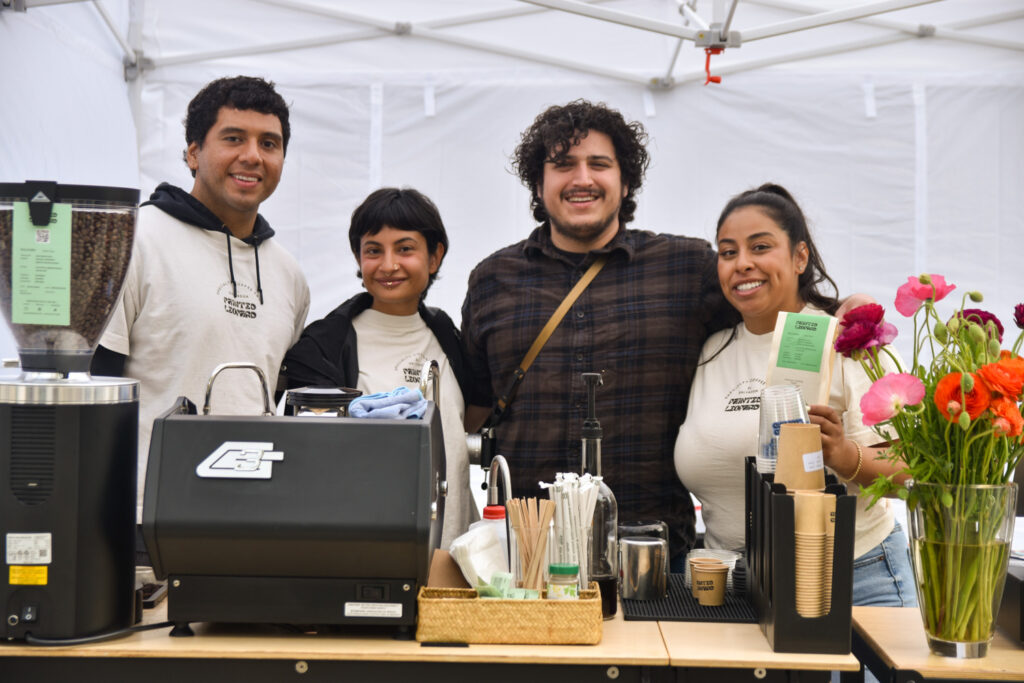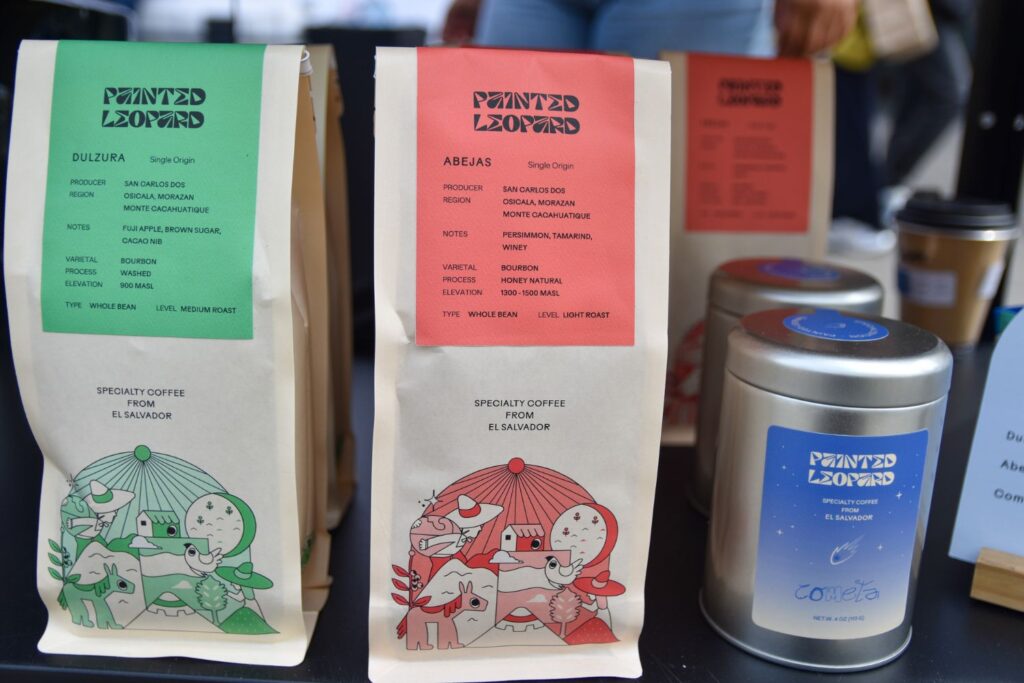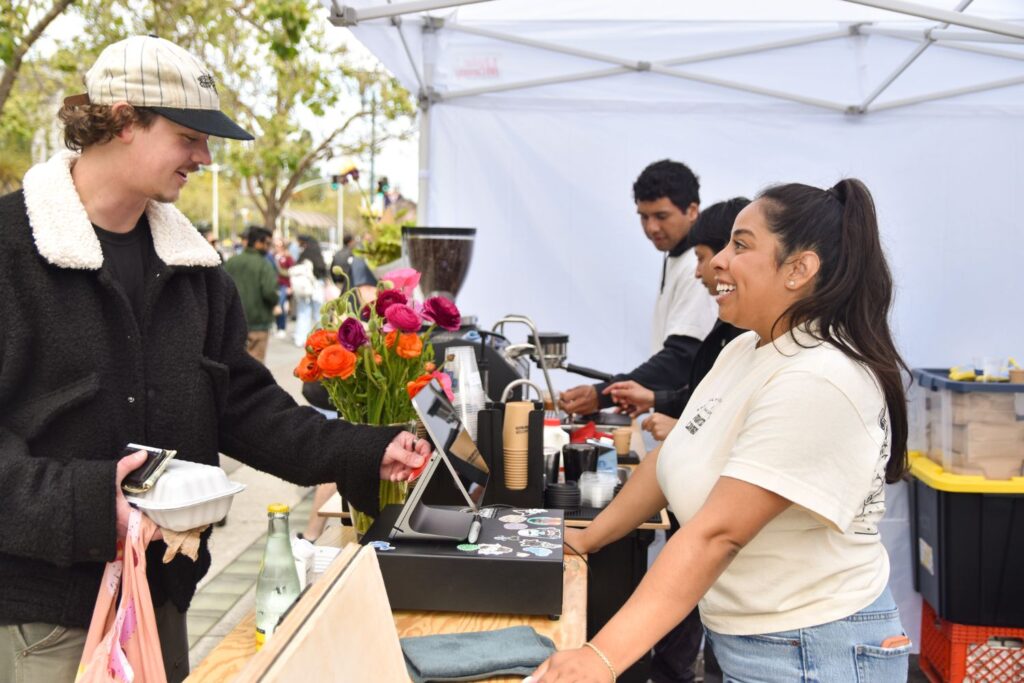Painted Leopard: Bringing Specialty Coffee from El Salvador to the Bay
Sheree Bishop, Communications Coordinator
May 30, 2025

Painted Leopard tells the story of their origin in every cup. Through engaging in direct trade and ensuring fair pay for coffee growers, founders Claudia Campos and Daniel Ortiz work to support the small cooperative farms of their family’s hometown in El Salvador. At the Ferry Plaza Farmers Market, locals can taste specialty single-origin coffee brought straight from the Cacahuatique Mountains in El Salvador and roasted weekly in Oakland.
Connecting Coffee, Culture, and Ancestry
For Claudia, coffee has been a staple in her family for generations. “My great-grandma passed away at 110,” Claudia says. “And even to her last moments, she was asking for coffee.” Claudia’s mother was raised in Osicala, a city in the Morazán Department where her great-grandmother lived, and where Painted Leopard sources their coffee.
After her parents fled the war in El Salvador, they brought their culture with them to the US. Claudia and her cousin, Daniel Ortiz, grew up with strong ties to their cultural practices. In 2021, Claudia and Daniel were gifted bags of coffee sourced from the Cooperativa San Carlos Dos in Osicala. The more they both compared it to what they had in California, the more they both realized what the Bay Area coffee scene was missing.
The idea of starting a coffee business offered a unique opportunity to share a piece of their culture with the Bay, knowing that they had close ties to the place where their coffee would come from. They spent two years developing their business idea, during which they traveled to visit the San Carlos Dos Cooperative and designed colorful artwork inspired by Fernando Llort, an iconic Salvadoran artist.
Though Claudia had no previous experience managing a food business, she saw how her vision for Painted Leopard aligned with her past experience as a public health professional.
“When we started working with the farmers, and seeing the impact that we could bring to this region by doing direct trade and paying higher prices for the coffee, I was like, ‘This is where my public health background comes in.’ I was really interested in applying what I had from my past into something that would be mine, which would be this coffee brand and this business,” Claudia says.

San Carlos Dos: Cooperating with Small Farms for High-Altitude Beans
The San Carlos Dos cooperative works with small farms in and around Osicala on the Cacahuatique Mountains, a hilly area in Eastern El Salvador near Cerro Cacahuatique, an extinct volcano. The high altitude on the mountain, over 1,400 meters (about 4,500 feet) above sea level, and the warm climate allow for high-quality coffee to grow. Volcanic soil lends an acidic and aromatic flavor to coffee, while native plants like tamarinds, passion fruit, mangoes, and guavas add a layer of sweet and fruity notes.
Claudia says that the specialty coffee process helps highlight the terroir. “It was very bold but also fruitful. And it stood out. It was a treat. It wasn’t like, ‘Oh, I’m drinking a strong cup of coffee because of the bitterness and the taste to get me going.’”
At cooperatives like this one, small, local farmers collaborate to pool resources and increase access to resources and buyers. They have a team that handpicks coffee cherries from trees, as well as the machinery needed to clean and process the coffee. In turn, the farmers receive a payout for their work.
Growing and procuring high-quality coffee also comes with challenges. The cooperative was heavily impacted by the war. San Carlos Dos began with 300 members, but in 1983, just three years after it was founded, most of them fled the country, leaving 15 farmers still on Cacahuatique Mountain with their infrastructure heavily damaged.
“This land was destroyed by the civil war in El Salvador that caused my mom to leave. When the farmers came back after the war, they replanted all these coffee trees in that region,” Claudia says.
When speaking with farmers in the cooperative, the economic challenges they face became evident.
“I saw the opportunity of being able to pay fair wages to the co-op and the farmers. We wanted to ensure that we were purchasing specialty coffee at its fair price, not at commodity price,” Claudia says, “We wanted to make sure that the farmer not only had enough to reinvest into the harvest, but also put food on their table. They would sometimes not make enough or even make enough to sustain their families.”
Climate change has also had an impact on agriculture in Morazán. Claudia says that, because last year’s rainfall was less than what farmers expected, the entire cooperative ended up with a lower volume of coffee to harvest. In turn, because Painted Leopard only purchases from San Carlos Dos, the roaster had to scale slowly to match a lower yield from farmers.

From El Salvador to the Bay: The Geography of Coffee
The name of their business is also a reference to where their coffee comes from, since many ocelots can be found roaming through Central and South America. “Painted leopard” is a common nickname for these traveling animals. “We wanted something that would help capture the journey of us bringing coffee to different parts of the world, just like that little leopard cat moves around through Latin America.”
Now, their single-origin specialty coffee can be found at several farmers markets and pop-ups in the Bay Area, as well as online. To focus on the quality of the coffee, they only serve medium and light roasts.
As their brand picks up steam and continues to draw more regulars, Claudia hopes people can see all of the work that Painted Leopard’s small team does to bring high-quality coffee to the Bay Area and beyond.
“We’re excited to bring in something different, to be able to share our story and be able to share the one thing that keeps many of us going in the morning, which is coffee,” Claudia says.
Find Painted Leopard in the front plaza at the Ferry Plaza Farmers Market on Saturdays.
Topics: Farmers market, Small business
